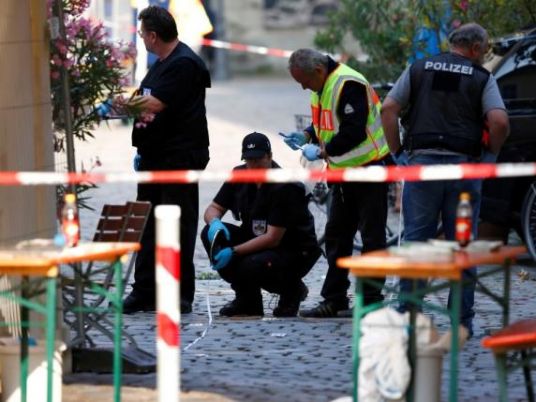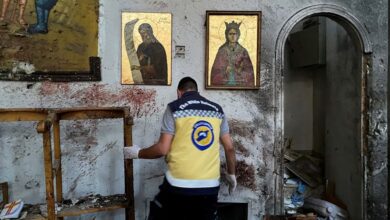
A 27-year-old Syrian man denied asylum in Germany a year ago blew himself up on Sunday outside a crowded music festival, injuring 12 people in the country's fourth violent attack on members of the public in less than a week.
A spokeswoman for the Bavarian state police force said on Monday it was unclear whether the man was an Islamist militant, and that investigations were continuing.
German newspaper Die Welt quoted Bavarian Interior Minister Joachim Herrmann earlier as saying: "My personal view is that it is unfortunately very likely that a real Islamist suicide attack took place here."
The incident, on top of three other attacks since July 18 that left 10 people dead and 34 injured, will fuel growing public unease about Chancellor Angela Merkel's open-door refugee policy. More than a million migrants have entered Germany over the past year, many fleeing war in Afghanistan, Syria and Iraq.
Police said three of the 12 wounded were in a serious condition after the attack in Ansbach, a town of 40,000 people southwest of Nuremberg that has a US Army base.
The dead man had been in treatment after twice before trying to kill himself, though Sunday evening's explosion was more than just "a pure suicide attempt", Herrmann told Reuters. An Islamist link could not be ruled out, he told reporters earlier.
"It's terrible … that someone who came into our country to seek shelter has now committed such a heinous act and injured a large number of people who are at home here, some seriously," Herrmann told a news conference early on Monday.
"It's a further, horrific attack that will increase the already growing security concerns of our citizens. We must do everything possible to prevent the spread of such violence in our country by people who came here to ask for asylum."
Herrmann told Reuters the recent attacks raised serious questions about Germany's asylum law and security nationwide. He planned to introduce measures at a meeting of Bavaria's conservative government on Tuesday to strengthen police forces, in part by ensuring they have adequate equipment.
Herrmann said the Syrian asylum seeker arrived in Germany two years ago and had been in trouble with local police repeatedly for drug-taking and other offenses.
He said investigators had yet to determine the motive of the attacks. "Because the rucksack and this bomb were packed with so many metal parts that could have killed and injured many more people, it cannot simply be considered a pure suicide attempt."
It was the second violent incident in Germany on Sunday and the fourth in the past week, including the killing of nine people by a deranged 18-year-old Iranian-German gunman in the Bavarian capital Munich on Friday.
Explosives, metal parts
Herrmann said the man, whose identity has not yet been released, had been living in Ansbach for a year. Although his application for asylum had been denied, he was not in danger of being deported immediately given the civil war in Syria.
One US intelligence official, speaking on condition of anonymity, said investigators would focus on what the bomber was doing before he left Syria and why he was denied asylum.
US security sources said the bombing did not appear to be a well-planned operation and could well turn out to be the act of another mentally unstable individual.
Herrmann said the man had been denied entry to the Ansbach Open music festival shortly before detonating the bomb outside a restaurant. More than 2,000 people were evacuated from the festival after the explosion, police said.
Ansbach resident Thomas Debinski said people panicked when they heard the explosion, especially after the events of the past week, and it soon became clear that someone had set off a bomb in a rucksack.
Earlier on Sunday, a 21-year-old Syrian refugee was arrested after killing a pregnant woman and wounding two people with a machete in the southwestern city of Reutlingen, near Stuttgart.
"After what just happened in Munich, and today in Reutlingen, what you hear about, it is very disturbing, when you know that such a thing can happen so close to you, in such a small town as Ansbach," Debinski said.
A week ago a 17-year-old youth who had sought asylum in Germany was shot dead by police after wounding five people with an ax near Wuerzburg, also in Bavaria. He was initially thought to be Afghan but federal Interior Minister Thomas de Maiziere has since said he may have been from Pakistan.
Police said neither Sunday's machete attack nor Friday's shooting in Munich bore any sign of connections with Islamic State or other militant groups.
Islamic State claimed responsibility for the Wuerzburg attack as well as the July 14 rampage in the French Riviera city of Nice in which a Tunisian man drove a truck into Bastille Day crowds, killing 84 people.




